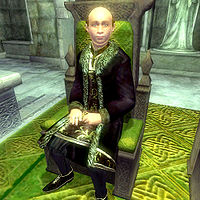| Count Marius Caro | |||
|---|---|---|---|
 Count Marius Caro circa 3E 433 Count Marius Caro circa 3E 433
|
|||
| Race | Imperial | Gender | Male |
| Born | Third Era |
||
| Died | Fourth Era |
||
| Resided in | Leyawiin | ||
| Appears in | Oblivion | ||
Marius Caro was the count of Leyawiin during the late Third Era and early Fourth Era.[1][2]:26 He was the heir to a long lineage of counts, as House Caro had ruled Leyawiin since the early days of the Second Empire.[3] He and his father were loved by the people of Leyawiin.[4] Circa 3E 432, he married Alessia Valga, daughter of Count Charus Valga and Countess Arriana Valga of Chorrol.[1][5]
Many of Leyawiin's citizens were unhappy with his marriage to Alessia, as she had a strong dislike for non-Imperial cultures and races, and she wished to introduce an Imperial-dominated culture to Leyawiin.[6][7] The union of Marius and Alessia was considered a perfect blend of love and wise political maneuvering, as they seemed to be well-matched on a personal level and were both staunch supporters of Imperialization in Leyawiin.[5][1] There were rumors that Marius and Alessia had a secret torture room in Castle Leyawiin, where they tortured Argonian immigrants from Black Marsh.[8][9]
During Caro's reign, County Leyawiin was troubled by the Renrijra Krin insurgency, which desired to reclaim the long-disputed land that the Mane had recently ceded to Cyrodiil, which the insurgents felt belonged to Elsweyr.[10][11][12] The Count took steps to deal with the insurgency, but he did not have enough manpower to patrol County Leyawiin's borders.[12][13] Caro created the Knights of the White Stallion, a chivalric order dedicated to eradicating banditry in County Leyawiin.[13]
During the Oblivion Crisis of 3E 433, Caro felt that High Chancellor Ocato and the Elder Council focused obsessively on the provinces and left Cyrodiil to fend for itself. After an Oblivion Gate opened outside of Leyawiin, the city was beset by the forces of Mehrunes Dagon, but they received no help from the Empire and the Imperial Legion.[13] Despite this, he provided military aid for Bruma once the Oblivion Gate outside of Leyawiin was closed.[14]
After the Empire's collapse in the early Fourth Era, Bravil and Leyawiin both became independent and were often at odds with each other.[2]:223 By 4E 48, they had been reincorporated into the Empire under the rule of Titus Mede I; however, Leyawiin remained restless.[2]:155, 223 By 4E 48, Caro still reigned as count, and his daughters had become infamous for poisoning his guests while they were visiting Leyawiin's court.[2]:26
See AlsoEdit
- For game-specific information, see the Oblivion article.
ReferencesEdit
- ^ a b c Guide to Leyawiin — Alessia Ottus
- ^ a b c d The Infernal City — Greg Keyes
- ^ Traveler's Guide to Leyawiin — Astinia Isauricus; published 1 Frost Fall, 2E 569
- ^ Witseidutsei's dialogue in Oblivion
- ^ a b Pocket Guide to the Empire, 3rd Edition: The Seat of Sundered Kings: Cyrodiil — Imperial Geographical Society, 3E 432
- ^ On-Staya Sundew's dialogue in Oblivion
- ^ Tsavi's dialogue in Oblivion
- ^ Hlidara Mothril's dialogue in Oblivion
- ^ Deeh the Scalawag's dialogue in Oblivion
- ^ Pocket Guide to the Empire, 3rd Edition: Sugar and Blood: the Cats of the South — Imperial Geographical Society, 3E 432
- ^ Ahzirr Traajijazeri — Anonymous
- ^ a b Rumors in Oblivion
- ^ a b c Marius Caro's dialogue in Oblivion
- ^ Events of Allies for Bruma in Oblivion